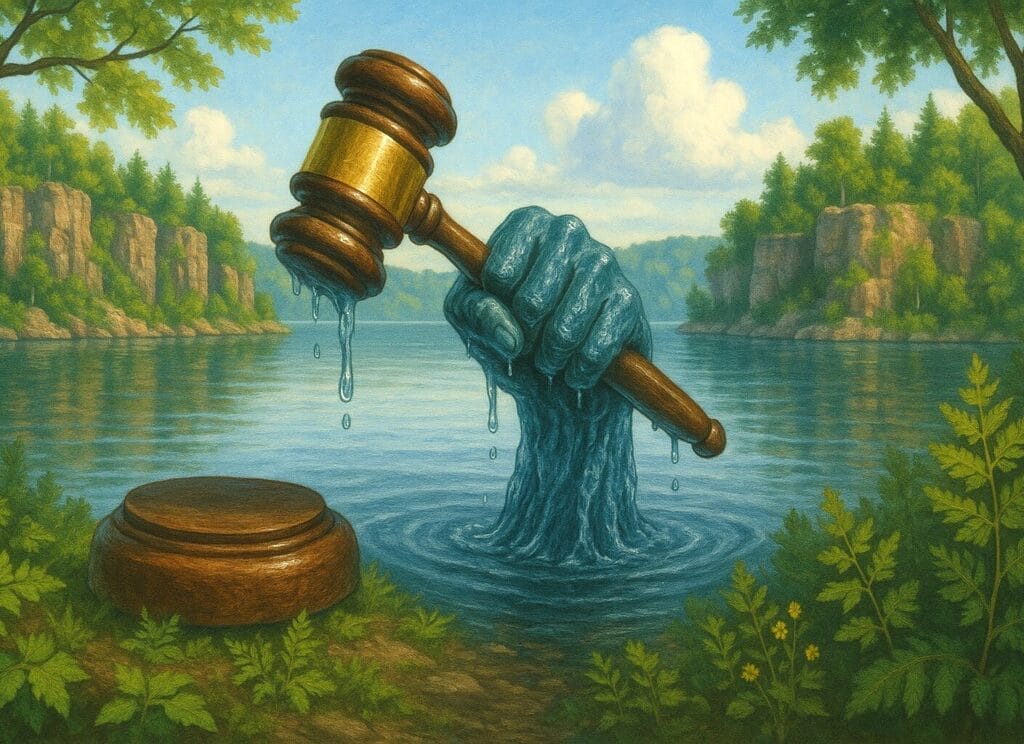If your lightbulbs are connected to the power plant that’s connected to the lake, you’ll pay
Went over to Devil’s Lake last weekend to look at leaves, did you? Good choice. Lovely place.

Did you get the lake’s permission?
No, I’m not kidding. Neither are the Assembly Democrats who last month announced they’ll introduce a bill to grant Devil’s Lake State Park legal rights, as if it weren’t a set of inanimate rocks, water, trees and lichens. They’d treat it as if it were instead a sort of person with interests all its own apart from those of the people of Wisconsin, who own it.
Utterly straight-faced, Rep. Vincent Miresse (D-Stevens Point) and colleagues — including two Milwaukeeans in the Assembly’s Socialist Caucus, Ryan Clancy and Darrin Madison — would grant the park “the right to naturally exist, flourish, regenerate, and evolve.” They say the lake has a right to “abundant, pure, clean, unpolluted water,” to “natural biodiversity,” to “full restoration,” among other things.
The proposal doesn’t say that Devil’s Lake should be unpolluted because humans will enjoy that, or that biodiversity is good for people. It says the lake has rights whether or not that benefits humans.
Unveiling the measure, Miresse sang the kumbaya of old-time ecology, saying we’re part of “living systems.” But not too special a part: The announcement included a homily from a green activist who intoned that “nature is not property. It’s our relative.”
We were warned. The Milwaukee County Board in 2023 passed a resolution saying that nature has rights. Green Bay’s pondering one because an alderman, seeing plans for new houses near a geological feature, said, “What about the escarpment?” There are nonprofits promoting resolutions nationwide.
You may not be interested in such sentimentality, but to paraphrase Trotsky, its enforcers are interested in you. The Democrats’ proposal not only grants these rights to Devil’s Lake, it declares that “no business may engage in activities that infringe upon the rights.” If they do, it’s a $1,000 fine “for each violation.”
The attorney general can enforce this, but so can anyone else: “Any individual may file a legal action … in the name of Devil’s Lake State Park as the real party in interest” to enforce the lake’s rights, Democrats propose.
And once a self-appointed guardian attacks, says the proposal, the person accused “bears the burden of proving that no violation exists.”
Well, just don’t pollute, right?
Except the proposal doesn’t say what might impair the lake’s rights.
If you drive through the park and emit exhaust, however little, is the convenience store that sold you the gas an accessory to hurting the lake’s right to flourish?
That store used electricity. Did any of it come from the coal-fired power plant nearby — the one said to be impairing the lake’s right to “a healthy natural environment”? That’s a thousand bucks. Per day? Per kilowatt? The proposal doesn’t say.
How about farmers’ nearby tractors? How about exhaust from jets flying above? From cars on I-90 nearby? That’s up to lawsuit-minded citizens.
If you deadname the water — the legislative language painstakingly notes the lake’s proper Ho Chunk name is Tee Wakącąk — might you hinder its evolution?
The premise of ecology is that everything in the environment is connected. The logic of the proposal is to empower anyone who doesn’t like modern farming, power plants or cars to drag into court, on behalf of a lake’s rights, anything in that chain of connection.
Which is everything.
Were this somehow to become law, the way to avoid trouble wouldn’t be, as with current environmental rules, to not exceed some publicly agreed-on standard. Rather, we’d all have to think as the green revolutionaries do: “Does my hamburger encourage livestock farming that could impinge on biodiversity, which Devil’s Lake… uh, Tee Wakącąk has a right to?”
Not only would the law shift the burden of proof onto the accused, it would fine you $1,000 if you didn’t raise your green-revolutionary consciousness — to, as Al Gore put it, make the environment your “central organizing principle.”
And it would utterly discard the sensible thinking that permitted rising American prosperity to co-exist with an improving environment: the understanding that natural resources exist for humans’ use and that we’re served best when they’re used prudently, conservatively.
By contrast, a resource’s “right to exist” is a right to not be used at all.
Dismiss it as fringe games from an out-of-power party, but it shows what at least some Democrats mean to do when given a majority, which redistricting may well give them. Miresse said they started with Devil’s Lake State Park only because it’s a well-known, defined spot. The proposal “shows us the path forward — it is a start,” said Madison.
Where that path goes, no one can tell, because it’d be defined by anyone who drags you into court on the grounds that you’re outranked by a scenic pothole.
Patrick McIlheran is the Director of Policy at the Badger Institute.
Any use or reproduction of Badger Institute articles or photographs requires prior written permission. To request permission to post articles on a website or print copies for distribution, contact Badger Institute Marketing Director Matt Erdman at matt@badgerinstitute.org.




